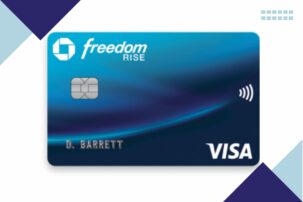Apple Card: Is It a Good Option for Building Credit?

The Apple Card has gained popularity as a credit card designed for Apple users, offering seamless integration with Apple Pay and a simple, fee-free structure. Many people consider using it to build their credit, but is it actually an effective tool for improving a credit score?
Before applying, it’s important to understand how the Apple Card works, its benefits, and whether it truly helps build credit. In this article, we’ll explore its features, compare it to other credit-building options, and help you decide if it’s the right choice for your financial needs.
What is the Apple Card and how does it work?
The Apple Card is a credit card issued by Goldman Sachs and designed primarily for iPhone users. It works seamlessly with Apple Pay, allowing users to make contactless payments and track transactions easily through the Wallet app.
Applying for the Apple Card is done entirely through an iPhone, and once approved, users receive a digital card immediately, with the option to request a physical titanium card. Unlike many traditional credit cards, the Apple Card focuses on simplicity, no fees, and cash back rewards.
If you’re considering applying, check out this step-by-step guide on how to apply for the Apple Mastercard Credit Card.
Key features of the Apple Card:
- No fees – No annual fees, late payment fees, or foreign transaction fees.
- Daily Cash rewards – Earn 1% to 3% cash back on purchases.
- Apple Pay integration – Secure payments with Face ID and instant expense tracking.
- Interest rates vary – Based on creditworthiness, APRs range from 15.99% to 26.99% (source: Apple Support).
Apple Card: Is it a good option for building credit?
Using a credit card responsibly can help improve your credit score, but the Apple Card’s impact on credit building depends on how it is used.
How the Apple Card affects your credit score:
- Credit utilization – Keeping your balance low relative to your credit limit can help your score.
- Payment history – Paying on time is essential to building good credit.
- Credit age – Since the Apple Card is relatively new, it won’t immediately contribute to a long credit history.
The Apple Card reports to TransUnion and Experian, two of the three major credit bureaus, which means responsible use can help build credit. However, unlike some traditional credit cards, it doesn’t offer credit limit increases, which could limit long-term credit growth.
Apple Card benefits and drawbacks
While the Apple Card has some unique perks, it also has limitations. Below is a breakdown of its advantages and disadvantages:
Benefits of the Apple Card:
- No fees: No annual, late, or foreign transaction fees.
- Daily Cash rewards: 1% cash back on all purchases, 2% on Apple Pay transactions, and 3% on select brands.
- Strong security features: Uses Face ID and Touch ID for authentication.
- Seamless expense tracking: The Wallet app categorizes spending and provides insights.
Drawbacks of the Apple Card:
- Limited to Apple users: You must have an iPhone to apply and manage the card.
- Higher interest rates: APRs range from 15.99% to 26.99%, which is higher than many traditional credit cards.
- Doesn’t support credit limit increases: Unlike many other cards, Apple Card users can’t request a higher credit limit over time.
Feature | Pros | Cons |
Fees | No annual, late, or foreign transaction fees | None |
Rewards | Up to 3% cash back | Only higher rewards for Apple Pay transactions |
Credit impact | Reports to TransUnion & Experian | No credit limit increases |
User restrictions | Great for Apple Pay users | Requires an iPhone |
How does the Apple Card compare to other credit-building cards?
When considering the Apple Card for credit building, it’s essential to compare it to other credit-building options, such as secured credit cards and traditional beginner-friendly credit cards.
Card Type | Credit Score Requirement | Fees | Best For |
Apple Card | Good to Excellent (660+) | No fees | Apple users who pay in full |
Secured Credit Cards | Low to Fair (580-650) | Annual fee (varies) | People building/rebuilding credit |
Traditional Starter Credit Cards | Fair to Good (600-700) | Some may have fees | Students or first-time cardholders |
Secured credit cards are often better for people with low credit scores, as they require a deposit that acts as collateral. The Apple Card, in contrast, is best for those with good credit who want to avoid fees and earn rewards.
Alternatives to the Apple Card for building credit
If your main goal is building or improving credit, the Apple Card might not be the best option. Consider these alternative credit-building tools:
- Secured credit cards: These require a deposit but report to all three credit bureaus, making them one of the best ways to build credit.
- Credit-builder loans: Offered by banks and credit unions, these loans help establish a positive payment history.
- Retail/store credit cards: Some department stores offer credit cards with low credit requirements, but they often have high interest rates.
For more financial tips on credit management, check out this financial literacy guide.
Who should get the Apple Card?
The Apple Card is ideal for certain users, but may not be the best choice for everyone.
The Apple Card is a good choice for:
- People who pay off their balance in full every month to avoid high interest rates.
- Those who frequently use Apple Pay to maximize cash back rewards.
- Users looking for a simple, fee-free credit card with strong security features.
Who should consider other options?
- People without an iPhone, since the Apple Card is exclusive to Apple’s ecosystem.
- Those who need a credit limit increase over time to build a stronger credit profile.
- Anyone looking for a card that reports to all three credit bureaus for better credit-building potential.
Financial literacy and smart credit habits
Regardless of the credit card you choose, responsible usage is key to maintaining a strong credit score. Follow these smart credit habits to improve your financial health:
- Always pay on time – Late payments can hurt your credit score.
- Keep credit utilization low – Try to use less than 30% of your available credit.
- Monitor your credit score – Regularly check your credit report through Experian, Equifax, or TransUnion.
- Avoid unnecessary debt – Only use credit for necessary purchases that you can pay off.
To learn more about managing credit wisely, check out our financial literacy resources.
The Apple Card is a great option for Apple users who want a fee-free credit card with cash back rewards, but it may not be the best choice for everyone looking to build credit.
If you already have a good credit score and plan to pay your balance in full each month, the Apple Card offers great benefits with no fees. However, if you are new to credit or need to improve your score, you may be better off with a secured credit card or a card that reports to all three credit bureaus.
Before applying for any credit card, make sure to compare your options and choose one that fits your financial goals. Responsible credit use is the key to long-term financial success.
Related content

What Is Credit Card APR?

How to apply to Chase Freedom Rise Credit Card

How to apply to Chase Freedom Flex Credit Card

How to apply to Chase Sapphire Preferred Credit Card

How to apply to Capital One Walmart Rewards Mastercard
